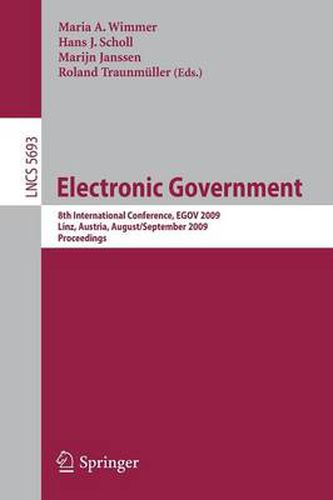Readings Newsletter
Become a Readings Member to make your shopping experience even easier.
Sign in or sign up for free!
You’re not far away from qualifying for FREE standard shipping within Australia
You’ve qualified for FREE standard shipping within Australia
The cart is loading…






This title is printed to order. This book may have been self-published. If so, we cannot guarantee the quality of the content. In the main most books will have gone through the editing process however some may not. We therefore suggest that you be aware of this before ordering this book. If in doubt check either the author or publisher’s details as we are unable to accept any returns unless they are faulty. Please contact us if you have any questions.
Years of worldwide economic depression do not only shatter private-sector ?rms and strain public-sector budgets, they also test the viability of academic conf- ences and other scholarly events. Given this context it is remarkable how well the eighth EGOV conference maintained its standing as an annual international conference with a global reach. Submissions from Europe increased over those from other parts of the globe. However, the conference upheld its attractiveness toscholarsfromaroundtheworldasavenueofhighreputation.The2009EGOV conference brought together scholars and practitioners from ?ve continents and 32 countries. Previous EGOV conferences were dedicated to three main areas, which ov- lap in part: eGovernment, eGovernance, and eParticipation. While the overlap still exists, a vibrant and sizable community has formed around topics of p- ticipation, inclusion, and democracy in the digital age. For the ?rst time, with ePartthistopicalstrandorganizeditsownconferencewithseparateproceedings. ePartaims to reviewresearchadvances inbothsocialandtechnologicalscienti?c domains, seeking to demonstrate new concepts, methods and styles of eParti- pation. The Chairs of both conferences consider it important to maintain close links and are committed to co-locating the two events in the years to come.
$9.00 standard shipping within Australia
FREE standard shipping within Australia for orders over $100.00
Express & International shipping calculated at checkout
This title is printed to order. This book may have been self-published. If so, we cannot guarantee the quality of the content. In the main most books will have gone through the editing process however some may not. We therefore suggest that you be aware of this before ordering this book. If in doubt check either the author or publisher’s details as we are unable to accept any returns unless they are faulty. Please contact us if you have any questions.
Years of worldwide economic depression do not only shatter private-sector ?rms and strain public-sector budgets, they also test the viability of academic conf- ences and other scholarly events. Given this context it is remarkable how well the eighth EGOV conference maintained its standing as an annual international conference with a global reach. Submissions from Europe increased over those from other parts of the globe. However, the conference upheld its attractiveness toscholarsfromaroundtheworldasavenueofhighreputation.The2009EGOV conference brought together scholars and practitioners from ?ve continents and 32 countries. Previous EGOV conferences were dedicated to three main areas, which ov- lap in part: eGovernment, eGovernance, and eParticipation. While the overlap still exists, a vibrant and sizable community has formed around topics of p- ticipation, inclusion, and democracy in the digital age. For the ?rst time, with ePartthistopicalstrandorganizeditsownconferencewithseparateproceedings. ePartaims to reviewresearchadvances inbothsocialandtechnologicalscienti?c domains, seeking to demonstrate new concepts, methods and styles of eParti- pation. The Chairs of both conferences consider it important to maintain close links and are committed to co-locating the two events in the years to come.